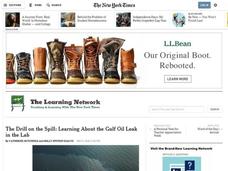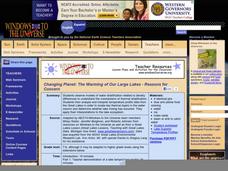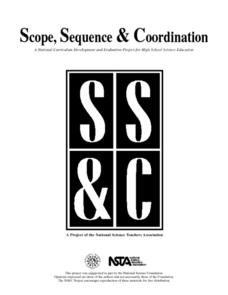Forest Foundation
Fire Investigation and Experimentation
Assess the probability of a wildfire with several lessons about fire danger ratings and risk factors. After experimenting with fuel moisture, learners explore the various elements that could contribute to a wildfire, such as wind speed,...
Carnegie Mellon University
Introduction to Climate
Begin a full lesson on climate change by demonstrating how carbon dioxide gas contributes to increased temperatures. Be aware that pressure inside the antacid-containing bottle in Activity 2 may cause the lid to fly off; keep viewers at...
Curated OER
Organic Materials in an Aquatic Ecosystem
Students evaluate the relationship between oxygen levels and the amount of organic matter in an aquatic ecosystem. They explain the relationship between oxygen levels, bacteria and the breakdown of organic matter using an indicator...
Curated OER
The Drill on the Spill: Learning About the Gulf Oil Leak in the Lab
Learners research the Gulf of Mexico oil spill and complete experiments to study the effects of oil spills. In this oil spill lesson, students read the NY Times feature on the gulf oil spill. Learners visit various links to research the...
Curated OER
Barn Owl Pellet Lab
In this lab instructional activity, high schoolers dissect a barn owl pellet then identify the different small animals found in the owl pellet. Using class data they calculate percentage present as well as complete 8 post lab questions.
Curated OER
Effects of Water Pollution on Aquatic Organisms
Learners investigate water pollution. They develop an understanding of the behavior of organisms, of the structure and properties of matter, and of natural and human induced hazards by conducting lab tests. They present their data...
Curated OER
Making A Terrarium
Students make a terrarium from common household items that are brought to class. They can be creative with materials but the method is set for how the mini-lab is set up. Students read a book about an ecosystem to stimulate the topic for...
Curated OER
Changing Planet: The Warming of Our Large Lakes - Reasons for Concern
Another A+ lesson on the impact of climate change comes to you from the National Earth Science Teachers Association. For this installment, learners model the stratification of water in lakes due to temperature differences. The lab also...
Curated OER
Classroom Aquaponics: Exploring Nitrogen Cycling in a Closed System
Students investigate nutrient cycling in a simplified desktop ecosystem involving aquarium and hydro-ponically grown plants. They set up an aquarium with 10 gallons of water at least a week before the lab is planned and place...
Curated OER
Pollution or Prevention?
Students examine potential contamination on the environment due to products and by-products of a new industrial process. Students conduct a lab that explores the economic differences between choices of pollution cleanup and prevention.
ARKive
Dinner at the Reef
Fine dining can happen anywhere, even in the coral reefs. Budding environmentalists explore marine food chains, predator-prey relationships and the importance of a balanced ecosystem. These important concepts are facilitated through a...
Curated OER
Limiting Factors for Populations
The "Bottled Bacteria" activity instructions are a bit unclear, but the remaining activities investigating limiting factors in ecosystems are well-written. Learners model the exosystem of a bear and a herd of deer. They set up a...
Columbus City Schools
Photosynthesis and Respiration
Thirty percent of the world's oxygen is produced by rainforests found throughout the world. Seventh grade learners explore the processes of photosynthesis and respiration through 10 days of labs, manipulatives, and discussions. They...
Curated OER
Water Contamination Mapping Lab
Students are introduced briefly to the Biscayne Bay Ecosystem, observed microbe distributions and water current maps are introduced. They measure water current speeds to predict the movement of pollutants based on the type of the tidal...
Curated OER
Does the Introduction of Pesticides and Fertilizers Alter an Aquatic Ecosystem?
Students conduct an experiment using a small sample from a local water source. They introduce fertilizers and pesticides, separately, and carefully examine the results in their simulated aquatic ecosystem.
Curated OER
Quadrate Lab
Students investigate tree stems and conduct an experiment on how non living factors affect living factors. In this tree stems lesson plan, students observe and record physical characteristics, and make predictions on what factors will...
Curated OER
Great Flathead Lake Ecosystem Mystery
Students analyze data to solve the mystery of what contributed to an ecological disaster at Great Flathead Lake. They read and graph the available data, create a food web of the problem ecosystem, and construct a formal problem statement...
Curated OER
Hydra Lab Worksheet
In this biology activity, students use the word list that is made part of the exposition of the concept of hydra and how they are part of the ecosystem.
Curated OER
The Mighty Hudson Stretches its Mussels
Students brainstorm possible causes of zebra mussel migration and population expansion. They identify the key causes and effects of the disturbance of the Hudson River ecosystem and research causes and effects in the disturbances of...
Curated OER
Owl Pellets
Sixth graders investigate the role of owls in their ecosystem. In this food chain lesson, 6th graders illustrate an owl food chain, dissect an owl pellet, and analyze data. Students discuss what would happen to owls if there were an...
Curated OER
Native Species Restoration and its Impact on Local Populations
Students explore how predators help control the growth of prey species for a more balanced ecosystem.
Curated OER
Predator-Prey Simulation
Students simulate a predator-prey interaction in an ecosystem. Students use different size squares cut from paper to represent predators and prey. They simulate the interactions of the species by following instructions for the capture of...
Curated OER
Salt Marshes And Their Inhabitants
Students investigate the ecosystem of the salt marshes. This is done in order to develop an appreciation for this type of environment. They conduct research using a variety of resources. Students are given samples of different organisms...
Captain Planet Foundation
Worm Your Way Out of This
How can you provide healthy soil for your garden? Study worms, bacteria, and other microorganisms in a lesson about decomposition and organic compost. After discussing what you know about worms and watching a video, watch what worms do...

























